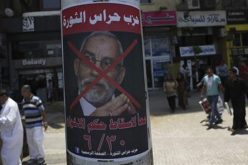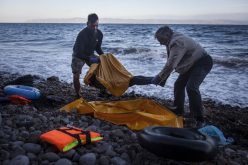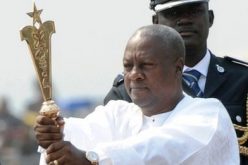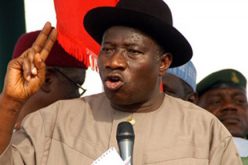
Photo: Crown Copyright
Insecurity in West Africa. Fostering development can help blunt extremist violence, observers say
DAKAR, (IRIN) – Academics and government, military and civil society representatives gathered for a conference in the Senegalese capital this week to assess the interplay between development and violent extremism in West Africa, with some participants suggesting that underdevelopment, marginalization and weak governance create a breeding ground for militancy.
While local factors in West African and Sahel countries have contributed to extremist violence, the rise of global jihad in the wake of the US-led “war on terror” since 9/11 has also played a part in spreading radical militancy in the region.
“In the Sahel, there is a combination of bad governance, poverty, insecurity as well as several internal and external factors [that contribute to extremist violence],” said Ahmedou Ould-Abdallah, head of the Centre for Security Strategy in the Sahel and the Sahara, at the opening of the 6-10 May Dakar conference.
“The Sahel has provided an ideal ground for extremist violence to take root and spread beyond national borders,” he said.
The region has a history of instability. Since the first post-independence coup in West Africa that toppled Togo’s founding president in 1963, it has seen a string of coups, some of which have sparked civil wars.
West Africa is also one of the world’s most impoverished regions despite its natural resources. Seven West African countries occupy the bottom 10 places in the UN Human Development Index.
Poor political and resource governance have often led to explosions of violence by disgruntled segments of society, and a number of studies have linked bad governance to insecurity in West Africa.
For example, Mali’s Tuareg have been fighting perceived marginalization by the central government and demanded an autonomous homeland in the country’s north. Following the March 2012 coup in the capital Bamako, the Tuareg National Movement for the Liberation of Azawad seized towns from government troops in the north, but was soon driven out by militant Islamist groups.
Nigeria’s increasingly violent Boko Haram militia, which wants an Islamic state, should be seen as a reaction the government’s entrenched corruption, abusive security forces, strife between the disaffected Muslim north and Christian south, and widening regional economic disparity, according to the Council on Foreign Relations.
Some observers stress the local aspect. Militant Islam in Africa, while linked to broader ideological currents, is mainly driven by the local context, with Islamist groups emerging, evolving and reacting to immediate local concerns, University of Florida’s Terje Ostebo, argued in a November 2012 paper published by the Africa Centre for Strategic Studies (ACSS).
“The Malian government’s failure to consistently invest [in] and maintain a strong state presence in the north. created an enabling environment for the expansion of Islamic militancy and the escalation of violence in this region,” said Ostebo, an assistant professor at the university’s Centre for African Studies (ACSS) and the Department of Religion.
Marginalization
“Poverty and underdevelopment and a sense of marginalization and exclusion that comes from lack of governance, particularly at the local level, are seen as drivers associated with violent extremism,” Benjamin Nickels, an assistant professor with the ACSS, told IRIN.
“Supporting development is a long-term approach to undermining drivers associated with violent extremism,” he added.
“You do have a number of underlying factors that make certain regions particularly vulnerable to violent extremism and extremist ideologies, and then you have a number of factors that trigger violence. Amongst these factors there is an underlying economic dimension that often gets missed,” said Raymond Gilpin, the ACSS academic dean.
Poverty, unemployment and socioeconomic deprivation partly explain the rise of Islamist movements – violent and non-violent – argued Ostebo.
“There are other factors of extremist violence. However, it is easier for militant groups to recruit unemployed youth who see no future for themselves, than those who are in employment. The more young people are able to be employed the less chances there are that they can be recruited by militant groups,” said Gilles Yabi of the International Crisis Group.
“Development is part of the measures against extremist violence. But we are already in a situation [in West Africa] where underdevelopment is so deep that reversing it is very difficult,” he told IRIN.
Ould-Abdallah cited other factors such as West Africa’s wide geographical area, weak public institutions and people’s and governments’ loyalty to tribe and clan rather than the nation state as also contributing to crime and extremist violence in the region.
In a bid to end insurgencies, Nigeria and Mali have attempted negotiated settlements, but they have also resorted to the use of force, which is limited in resolving the fundamental causes of rebellion. Repression by governments or external forces can cause Islamist militants to fight for their very existence and at the same time deepen perceptions of state illegitimacy, Ostebo warned.
Spillover
The French-led intervention in Mali has dislodged the Islamist rebels from their strongholds, but triggered fears that the fleeing militants could destabilize countries in the region from where they hail, target foreign nationals in neighbouring countries and even win the sympathy of other extremist militia.
The January attack on an Algerian gas plant is believed to have been in retaliation for the French military drive in Mali. Nigerian troops heading for Mali as part of an African intervention force came under attack by Boko Haram-linked militants in January.
On 7 May, Al Qaeda in the Islamic Maghreb posted a video message calling for attacks on all French interests across the world for its intervention in Mali.
Nigeria has teamed up with its neighbours to form a multi-national force to counter Boko Haram.
“The priority for Sahel right now is to help resolve the Mali crisis. After Côte d’Ivoire, Liberia and Sierra Leone, West Africa does not need another protracted crisis,” said Ould-Abdallah.
IRIN NEWS










